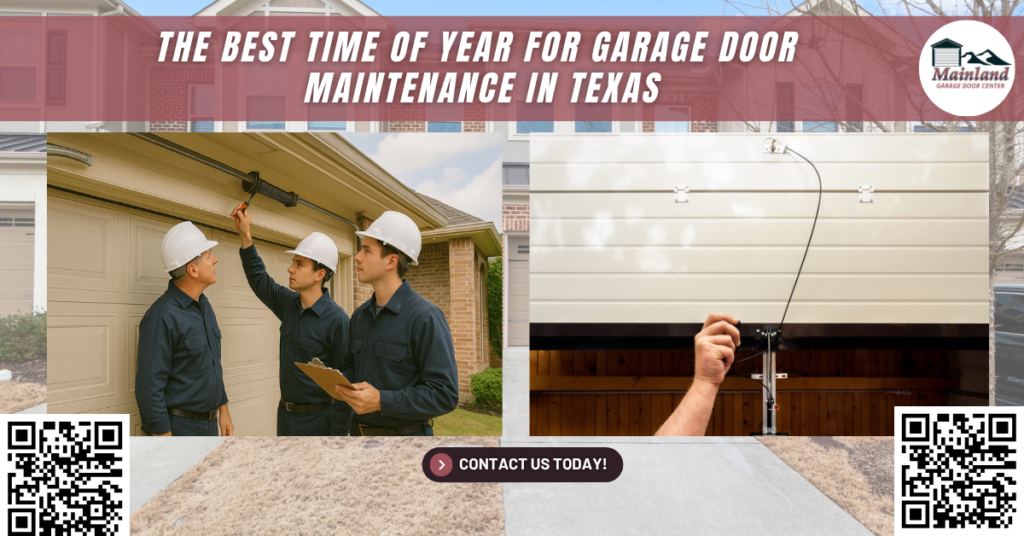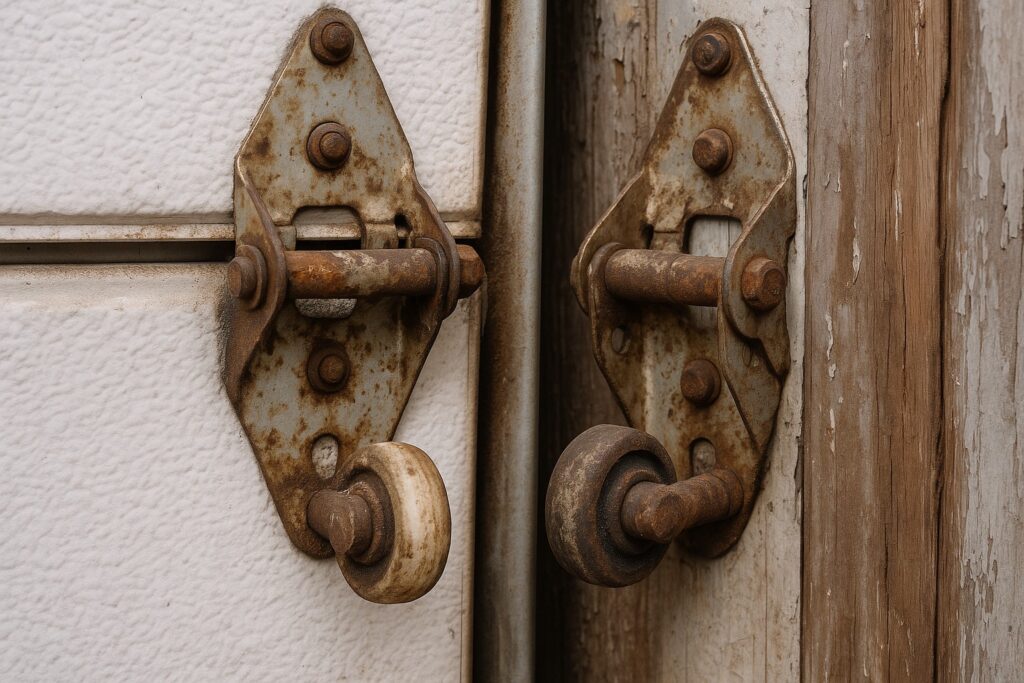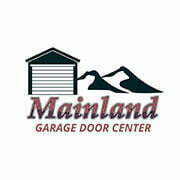The Best Time of Year for Garage Door Maintenance in Texas

Every summer, our team at Mainland Garage Door Center receives a surge of calls from Texas homeowners and businesses struggling with uncooperative garage doors. Last July, for instance, a local homeowner in Texas City called us in a panic. Her garage door was stuck halfway, making grinding noises and refusing to open. The problem? A combination of dried-up grease, worn-out garage door rollers, and warped tracks from intense heat. This unfortunate situation could have been avoided with routine garage door maintenance.
In Texas, extreme weather changes can have a major impact on your garage door system. High humidity, scorching temperatures, and heavy rains all contribute to faster wear and tear on vital garage door parts. According to recent studies, many garage door openers and springs fail during summer or winter when stress on moving parts is at its peak.
Many families overlook their garage door until it stops working. However, as one of the most frequently used entrances in the home, your garage door sees a lot of action. Regular use without scheduled maintenance can lead to premature failure of springs, rollers, and other critical components.
At Mainland Garage Door Center, we believe in preventative maintenance, not reactive repairs. We’ve seen firsthand how timely inspections can save families hundreds in repair costs and ensure quiet, safe, and smooth operation. The secret? Knowing the right time of year for garage door maintenance and staying ahead of problems before they start. With professional service, the right tools, and expert advice, your garage door can operate seamlessly year after year.
Why Garage Door Maintenance Matters
Garage doors are often the largest moving object in your home. Whether you have steel garage doors, wood doors, or a modern automatic opener system, consistent maintenance ensures that every part, from the torsion springs to the safety sensors, works in harmony. Proper upkeep extends the life of your system, enhances safety, and ensures energy efficiency.
Neglecting regular garage door maintenance can lead to serious problems like:
- Broken torsion springs, which may render the door immobile
- Frayed or snapped cables, which pose safety hazards
- Loose hinges and roller brackets that cause noisy and jerky motion
- Rust spots on steel components that compromise structural integrity
- Malfunctioning auto-reverse safety features that can endanger people or pets
Maintenance Tasks You Should Never Skip:
- Lubricate all moving metal parts, especially with white lithium grease to ensure quiet operation
- Inspect garage door tracks for debris, alignment issues, and rust buildup
- Check garage door rollers and replace any that are worn, cracked, or squeaking
- Test the garage door opener’s auto-reverse feature to ensure safety
- Tighten loose bolts and nuts using a socket wrench to reduce vibrations
- Inspect weather stripping and replace if it is cracked, brittle, or loose

Regular maintenance saves money on repairs, extends your system’s life by several years, and helps avoid major inconveniences.
How Texas Weather Impacts Garage Doors
The Lone Star State’s unpredictable climate takes a toll on overhead garage doors and openers. Between spring storms, summer heat, and occasional cold snaps, Texas weather challenges even the most durable garage systems.
Heat and Humidity
Texas summers regularly soar above 90°F. These temperatures cause garage door springs and metal parts to expand. Over time, expansion and contraction cause springs to weaken and crack. Lubricants like grease and spray lubricants evaporate quickly in high heat, leaving metal parts dry and noisy.
Common Summer-Related Garage Door Issues:
- Sagging garage door panels due to sun exposure and heat stress
- Warped top rails or tracks that can throw the system off balance
- Dried grease on rollers and bearings leads to increased friction
- Expansion of metal parts is causing misalignment and loud operation
Rain and Moisture
High moisture levels during spring and hurricane seasons promote rust on garage door parts and mold on weatherstripping. For wood doors, water damage can cause swelling and warping, which affects closing and sealing. Prolonged exposure to moisture can lead to corrosion of critical parts such as hinges, roller brackets, and steel springs.
Watch For:
- Rust spots on hinges, torsion springs, bolts, and cable ends
- Weatherstripping peeling off, softening, or becoming moldy
- Sensor malfunction due to condensation or wiring issues
Winter Chill
While Texas winters are mild, freezing temperatures can stiffen lubricants and make garage door openers sluggish. Rubber seals may harden, increasing noise and reducing energy efficiency. Batteries in openers and remotes may drain faster, causing delayed or failed responses.
Winter Maintenance Considerations:
- Replace grease with a winter-grade lubricant or garage door-specific spray
- Ensure door seals are flexible and properly installed
- Check opener battery levels and backup power features
Best Seasons for Garage Door Maintenance in Texas
Spring: The Smartest Season
Spring is the number one time for preventative garage door maintenance. After enduring winter cold, your door system deserves a tune-up to prepare for summer stress.
Spring Maintenance Tasks:
- Lubricate all garage door parts with spray lubricant
- Check for damage on rollers, springs, and hinges
- Clean tracks using a vacuum, soft brush, or damp cloth to remove debris
- Replace cracked weather stripping to improve insulation and energy efficiency
- Test automatic opener features, including remote control, wall button, and safety sensors
Spring is a great time to perform a full inspection of your garage door system. Temperatures are mild, and you can spot and fix problems before the intense heat causes further damage.
Fall: A Perfect Follow-Up
Fall is the second-best time for garage door maintenance. After a hot summer, your door might show signs of heat damage. It’s also an opportunity to prep your system before winter. Cooler temperatures allow lubricants to work effectively without melting or hardening.
Fall Garage Door Checklist:
- Check the door balance and cable tension
- Remove dirt, cobwebs, and debris from tracks and rollers
- Lubricate hinges, roller brackets, and torsion springs using garage door lubricant
- Look for water damage, rust, or swelling in wood doors and metal parts
- Test safety sensors, remote batteries, and wall controls for responsiveness
Fall tune-ups also ensure your garage door seals properly, helping to keep warm air inside and cold drafts out.
When to Avoid Maintenance
- July & August: Avoid maintenance during peak heat unless it’s an emergency. Metal parts are too hot to handle, and lubricants may not bond properly.
- Severe Weather Weeks: Postpone if heavy rain or wind is forecasted. High humidity can affect lubrication, while strong gusts pose safety risks during servicing. Safety is always the top priority.
Residential vs. Commercial Garage Door Maintenance
Residential Garage Doors
Home garage doors are usually opened and closed multiple times a day. If your family uses the garage as a main entryway, twice-a-year maintenance is crucial.
Recommended Tasks for Homeowners:
- Check the door opener battery and Wi-Fi signal for smart openers like Stealth Drive Connect
- Clean and inspect sensors for obstructions or dirt
- Test the manual release handle to ensure it functions during a power outage
- Grease steel hinges and garage door rollers to prevent squeaking
- Remove dust and spider webs from the opener mechanisms and light covers
Taking care of these tasks helps keep your garage door system operating quietly and safely, reducing wear on parts over time.
Commercial Garage Doors
Businesses that rely on commercial garage doors for deliveries or vehicle storage should schedule quarterly maintenance. High-use systems wear down faster and require closer monitoring.
Recommended Tasks for Businesses:
- Inspect steel tracks and cables for wear and tension
- Clean and lubricate all moving parts, including bearings and arm bars
- Test high-cycle openers and auto-reverse features for proper operation
- Replace damaged rollers, springs, bearings, or seals before failure
- Monitor for power surges or electrical faults in automated systems
Proactive maintenance ensures business continuity and minimizes costly downtime due to unexpected garage door issues.
DIY Maintenance Tips Between Professional Visits
You don’t have to be a professional handyman to complete basic garage door maintenance. These simple steps can be done every 2–3 months to extend the life of your system.
Monthly Visual Inspection
- Look for rust spots on metal parts, especially hinges, bolts, and brackets
- Check rollers for cracks, flat spots, or uneven wear
- Inspect cables and pulleys for fraying, corrosion, or tension loss
- Watch for misaligned tracks or roller brackets that can lead to a noisy operation
Lubrication 101
Apply a thin coat of white lithium grease or silicone-based garage door lubricant on:
- Hinges
- Roller shafts
- Springs
- Bearings
- Steel tracks
Avoid using heavy grease that can harden or attract dirt. Never lubricate nylon rollers or the belt/chain on openers unless specified by the manufacturer.
Safety Feature Test
- Place a 2×4 under the door. If the auto-reverse feature doesn’t activate, call for service.
- Wipe photo-eye sensors clean with a soft cloth and check alignment
- Pull the release handle to test manual operation in case of a power outage
Important: Never try to adjust torsion springs or cables yourself. These parts are under high tension and require expert handling.
Signs Your Garage Door Needs Immediate Service
Ignoring signs of trouble can lead to costly repairs or injuries. Call a professional garage door technician if you notice:
- Loud grinding, squealing, or scraping noises during operation
- Door opens halfway, then stops or reverses unexpectedly
- Rollers popping off tracks or shaking during movement
- Frayed cables, bent arms, or sagging panels
- Delayed response from your opener or blinking control panel lights
- Crooked or unevenly closing door can indicate spring issues

Quick service not only prevents accidents but also extends the longevity of your entire garage door system.
Final Thoughts: Long-Term Benefits of Garage Door Maintenance
Garage door maintenance isn’t just a seasonal chore — it’s an investment in the safety, performance, and longevity of your home or business. When performed at the right times of year, it reduces the risk of unexpected breakdowns, saves on costly repairs, and ensures quiet, efficient, and safe operation.
A well-maintained garage door system can last up to 15–20 years or more. That’s decades of reliable performance, curb appeal, and peace of mind. Staying consistent with maintenance ensures each moving part, from the cable and spring to the opener and sensors, functions in harmony.
With simple steps like lubrication, track cleaning, bolt tightening, and regular inspections, you ensure your door system stays strong for years to come. Whether you have a wood garage door that needs sealing or a modern automatic opener that needs software updates, the time to act is now.
Don’t leave your family’s safety or your business’s productivity to chance. A small investment in maintenance today prevents costly emergency repairs tomorrow.
How Can Mainland Garage Door Center Help You?
At Mainland Garage Door Center, we specialize in comprehensive garage door services tailored for the Texas climate. Whether you’re dealing with worn springs, damaged rollers, or an unreliable opener, our expert technicians are trained to diagnose and fix the problem quickly and professionally.
We offer:
- 25-point seasonal inspections with detailed reports
- Garage door opener repair and replacement
- Custom installations for homes and businesses
- High-quality steel, wood, insulated, and sectional garage doors
- Preventative maintenance programs for all garage door systems
- Emergency garage door repairs and same-day service when needed
Our team proudly serves Texas City and surrounding areas with a commitment to quality, safety, and top-tier customer service.
- 📍 Address: 10000 Emmett F Lowry Expy Avenue 9, Texas City, TX 77591
- ☎️ Phone: (832) 536-6690
- ✉️ Email: service@mainlandgaragedoorcenter.com
Schedule your seasonal garage door maintenance now and keep your system running like new, rain or shine!
Frequently Asked Questions (FAQs)
Q: How long does a typical garage door maintenance service take?
A: A standard maintenance visit usually takes 45 minutes to 1.5 hours, depending on the door’s condition and whether any parts need to be adjusted or replaced.
Q: Is it necessary to service a new garage door within the first year?
A: Yes, even new garage doors benefit from a check-up within the first year to catch any factory installation issues or early wear from frequent use.
Q: Can extreme Texas heat affect garage door paint or finish?
A: Absolutely, prolonged sun exposure can cause fading, chipping, or warping, especially on wood or painted metal garage doors.
Q: Does garage door maintenance help reduce noise?
A: Yes, regular lubrication of hinges, rollers, and tracks significantly reduces squeaks and grinding noises during operation.
